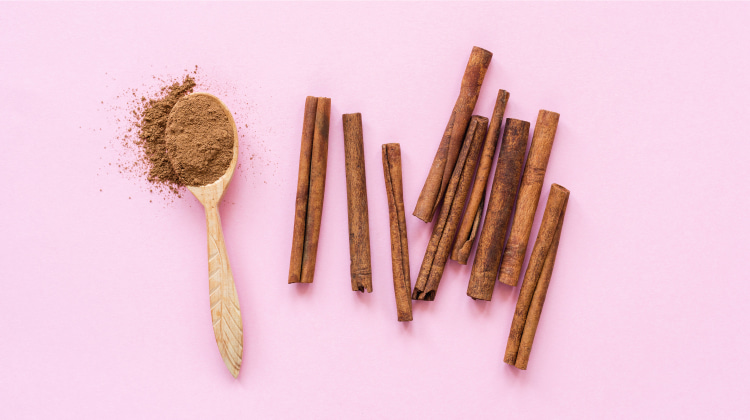
Cinnamon, that warm and aromatic spice we all love, has been making waves in the world of hair care lately. But is cinnamon good for hair growth? While some people swear by its effectiveness, it's essential to understand the science behind its potential benefits and separate facts from myths.
In this article, we'll explore the amazing benefits of cinnamon for hair, common misconceptions, how to use cinnamon for hair growth, and the necessary safety precautions. So, if you're considering adding a dash of this sweet spice to your hair care routine, read on and let's dive into the world of cinnamon and hair health together!
5 Amazing Benefits of Cinnamon for Hair
Cinnamon has been used for centuries to treat various ailments, and now it's making a name for itself in the hair care world. Let's explore some of the remarkable benefits of cinnamon for hair:
Reduce Hair Loss and Baldness
Cinnamon's rich polyphenol content acts as a natural antioxidant, helping to protect hair from damage caused by free radicals. Cinnamaldehyde, the primary compound in cinnamon, increases circulation and blood flow to hair follicles, which may reduce hair loss and help prevent baldness(1).
By strengthening hair follicles and promoting overall hair health, cinnamon can contribute to a fuller, more luscious mane.
Nourish The Scalp
Packed with essential vitamins, proteins, and minerals(2), cinnamon provides nutrients that are vital for hair health. Vitamins C, A, riboflavin, thiamine, and niacin all work together to nourish the scalp and promote healthier hair.
Additionally, cinnamon's natural exfoliating properties help to cleanse the scalp, removing dead skin cells and product buildup, leading to a healthier scalp environment for hair growth.
Fight Dandruff and Infections
The antimicrobial and antifungal properties(3) of cinnamon make it effective in combating Malassezia, the fungus responsible for causing dandruff.
By applying cinnamon oil to the scalp, you can enjoy the cinnamon oil benefits for hair, such as helping to prevent scalp infections and keeping dandruff at bay. A healthy, infection-free scalp paves the way for robust hair growth.
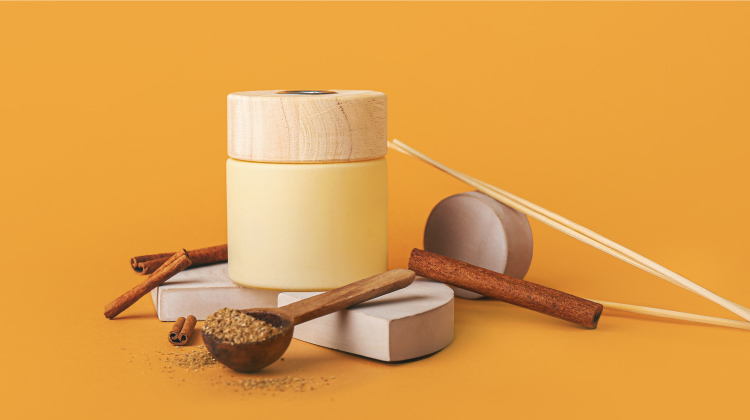
Stimulate Hair Growth
Does cinnamon help hair growth? You bet it does! Among the best herbs for hair growth, cinnamon stands out for its numerous advantages. When applied topically, cinnamon essential oil can help stimulate hair growth.
Cinnamaldehyde, present in the oil, dilates blood vessels and increases blood flow to the scalp, providing essential nutrients to hair follicles, making using cinnamon oil for hair growth a promising natural solution. On the other hand, drinking cinnamon water for hair growth is not supported by scientific evidence.
Help Control Lice
Cinnamon oil's antifungal properties could potentially help control lice(4) when mixed with shampoo. While not a definitive solution, it may be worth trying as a supplementary treatment for lice infestations, along with other conventional treatments.
Common Myths of Cinnamon Hair Benefits
Cinnamon has gained a reputation for its hair benefits, but it's crucial to separate fact from fiction. Here are some common myths surrounding cinnamon and hair health, along with the actual facts:
Rapid Hair Growth
- Myth: Cinnamon leads to instant, noticeable hair growth.
- Fact: Is using cinnamon for hair growth a myth? No, but hair growth is a gradual process, and it's essential to have realistic expectations. Typically, visible differences in hair growth take around 3-4 weeks, with hair growing about 6 inches per year on average.
Curing Scalp Acne
- Myth: Cinnamon can cure scalp acne.
- Fact: Cinnamon cannot cure scalp acne, as it requires a different treatment than facial acne due to product build-up in the hair follicles. However, cinnamon's antimicrobial and antifungal properties can help soothe itchy scalps and treat head lice.
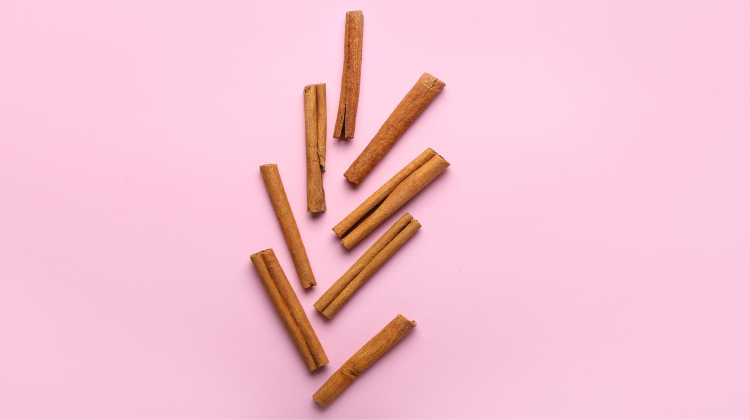
Preventing Hair Loss Entirely
- Myth: Cinnamon can entirely prevent hair loss.
- Fact: Although cinnamon can encourage hair growth and reduce hair loss, it cannot completely prevent hair loss. Addressing the underlying cause, such as stress, hormonal imbalances, or hereditary factors, is essential for dealing with hair loss effectively.
Instant and Dramatic Hair Color Change
- Myth: Cinnamon works as a powerful, instant hair dye.
- Fact: Cinnamon may gradually lighten hair color with continuous use, but it is not a potent or instant hair dye. Expect subtle color changes rather than dramatic ones, and remember that the process takes time and multiple applications.
Preventing Hair Breakage and Reversing Split Ends
- Myth: Cinnamon prevents hair breakage and repairs split ends.
- Fact: Cinnamon is not proven to prevent hair breakage or repair split ends. Improving hair care habits is vital for reducing breakage and split ends, as they result from factors like poor diet, over-washing, and chemical treatments. Focus on maintaining a healthy hair care routine to address these issues.
Cinnamon Oil Causes Hair Damage
- Myth: The tingling sensation from cinnamon oil is a sign of hair damage.
- Fact: The tingling sensation experienced when using cinnamon oil is due to increased blood circulation in the scalp, promoting hair growth, and not causing hair damage. Don't let the tingling sensation scare you – it's a sign that the cinnamon is working to promote hair growth.
How to Use Cinnamon for Hair Growth
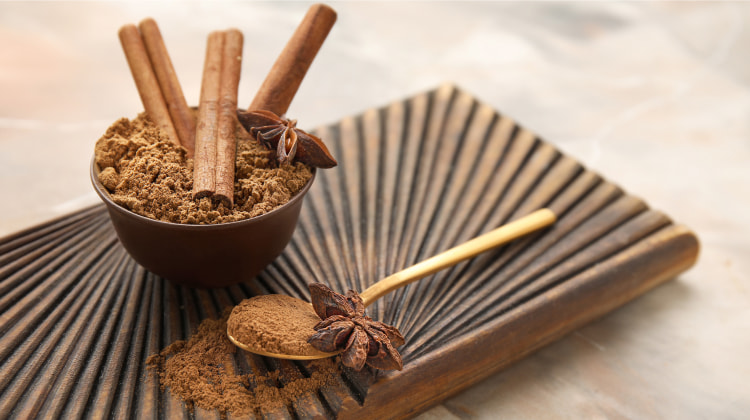
Cinnamon can be used in various forms, such as powder or oil, and you can create a variety of hair masks by combining with other nourishing ingredients. Here are some recipes to help you exploit cinnamon for hair benefits to its full potential:
Spice Blend Hair Mask
Combining the benefits of turmeric and cinnamon, this hair mask helps with hair growth and gives your scalp a healthy boost.
Ingredients:
- 1 teaspoon turmeric powder.
- 1 teaspoon cinnamon powder.
- 2-3 tablespoons olive or coconut oil.
Instructions:
- Heat the oil of your choice in a small bowl.
- Stir in the cinnamon and turmeric powders until well combined.
- Apply the mixture to your hair and scalp, then leave it on for 15-20 minutes.
- Wash your hair and scalp thoroughly with warm water and shampoo as usual.
Nutrient-Rich Hair Mask
This mask is packed with nutrients that nourish your hair and scalp, contributing to hair growth and overall hair health.
Ingredients:
- 1 tablespoon cinnamon powder.
- 1 egg yolk.
- 1 teaspoon olive oil.
- 2 tablespoons yogurt.
- 1 teaspoon honey.
Instructions:
- In a bowl, mix the cinnamon, egg yolk, olive oil, yogurt, and honey until they’re well combined.
- Apply the paste to your scalp and hair, ensuring even coverage.
- Put on a shower cap and leave the mask on for 20 minutes.
- Cleanse your hair with lukewarm water and mild shampoo.
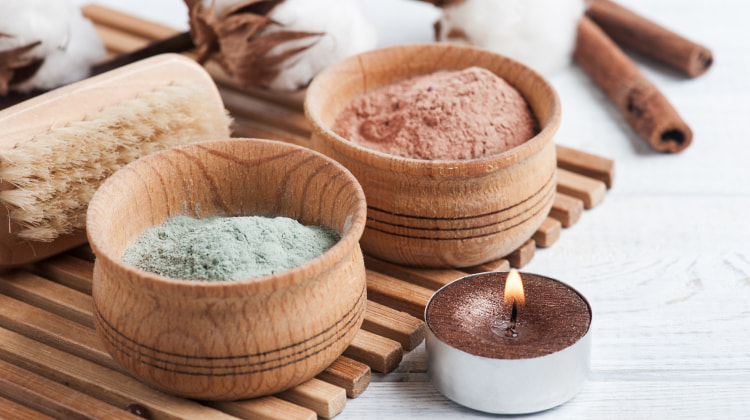
Tropical Hair Mask
A rejuvenating hair mask that combines the benefits of cinnamon and coconut oil(5) for promoting hair growth and a healthy scalp.
Ingredients:
- 4 tablespoons coconut oil.
- 3-5 drops cinnamon essential oil (or ½ tablespoon of ground cinnamon).
Instructions:
- Warm the coconut oil in a bowl.
- Mix in the cinnamon essential oil or ground cinnamon.
- Apply the mixture to your scalp and hair, covering all areas.
- Leave the rejuvenating hair mask on for 30 minutes.
- Wash your hair until it’s clean with warm water and shampoo.
Ginger and Cinnamon Hair Mask
Combining ginger and cinnamon for hair growth in a hair mask can provide added benefits, as ginger also has hair growth-promoting properties.
Ingredients:
- 1 tablespoon fresh ginger juice.
- 1 tablespoon cinnamon powder.
- 2 tablespoons honey.
- 2 tablespoons aloe vera gel.
Instructions:
- In a bowl, mix the fresh ginger juice, cinnamon powder, honey, and aloe vera gel until well combined.
- Apply the mixture to your hair and scalp, covering all areas.
- Massage the ginger and cinnamon mask into your scalp for a few minutes.
- Let the mask sit for 30-45 minutes.
- Wash your hair and scalp thoroughly with warm water and shampoo.
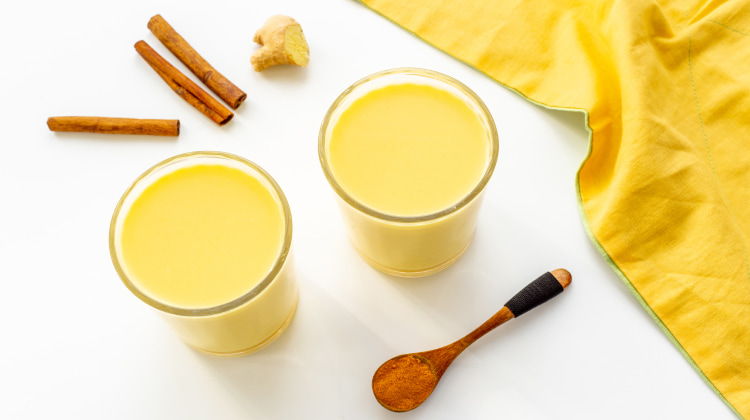
Coffee and Cinnamon Hair Mask
Using coffee and cinnamon for hair growth can give a caffeine boost to your scalp, improving circulation and promoting hair growth.
Ingredients:
- 2 tablespoons coffee grounds.
- 1 tablespoon cinnamon powder.
- 1 ripe avocado.
- 1 tablespoon raw honey.
Instructions:
- In a bowl, mash the ripe avocado until smooth.
- Add the coffee grounds, cinnamon powder, and raw honey to the mashed avocado, mixing until well combined.
- Apply the mixture to your hair and scalp, covering all areas.
- Massage the coffee and cinnamon mask into your scalp, then leave it on for 30-40 minutes.
- Wash the mask away with warm water and shampoo as usual.
Rosemary and Cinnamon Hair Rinse
This revitalizing hair rinse combines the power of rosemary(6) and cinnamon for hair growth, providing a natural solution to stimulate hair growth and nourish the scalp.
Ingredients:
- 1 tablespoon dried rosemary leaves.
- 1 tablespoon cinnamon powder.
- 2 cups water.
Instructions:
- In a saucepan, bring water, dried rosemary leaves, and cinnamon powder to a boil; then simmer for 10 minutes.
- Allow the mixture to cool then strain it into a container, discarding the rosemary leaves and cinnamon residue.
- After shampooing and conditioning your hair, pour the rosemary and cinnamon hair rinse over your hair and scalp, ensuring even coverage.
- Gently massage your scalp for a few minutes to improve absorption.
- Rinse your hair with cold water to seal the cuticles and lock in the benefits of the rosemary and cinnamon hair rinse.
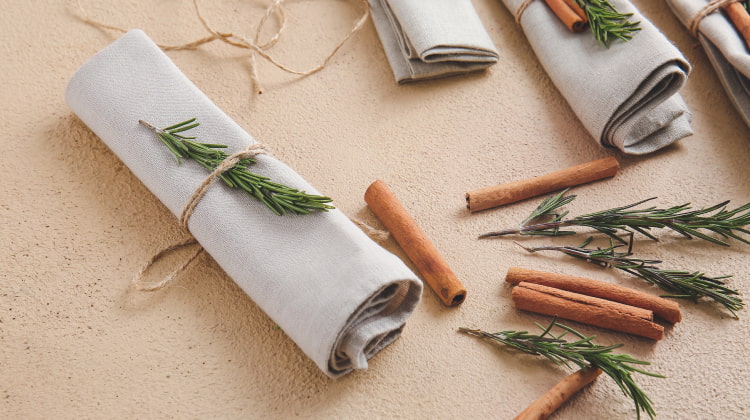
DIY Cinnamon Oil
The final recipe: how to make cinnamon oil for hair growth at home. Perfect for incorporating into hair masks, like the ones above, or other beauty treatments.
- Crush 3-4 cinnamon sticks into small pieces.
- Place the crushed cinnamon in a glass jar and cover it with carrier oil, such as olive or coconut oil.
- Seal the jar tightly and let it sit in a cool, dark place for 2-3 weeks, shaking it occasionally.
- After the waiting period, strain the mixture through a cheesecloth to remove cinnamon pieces and store the infused oil in a clean, airtight container.
Safety & Precautions
While cinnamon can work wonders for your hair, it's essential to be cautious and consider potential side effects. Just as with any ingredient, some people might experience allergic reactions or irritation when using cinnamon topically, whether in the form of oil or powder. To ensure a pleasant experience, it's important to follow these safety tips and precautions:
Patch Test
It's always wise to perform a patch test before using cinnamon on your hair or scalp. Apply a small amount of the cinnamon mixture to the inside of your elbow and wait for 24 to 48 hours. If you notice any irritation, redness, or rash, it's best to avoid using cinnamon on your hair.
Dilute Cinnamon Oil
Cinnamon oil is highly concentrated, so it's essential to dilute it before use. Mixing the oil with a carrier oil like olive or coconut oil can help prevent irritation or other adverse reactions.
Watch for Side Effects
Be aware of potential side effects, such as skin irritation, redness, rash, or burning sensation. In rare cases, chemical burns may occur due to prolonged contact or excessive use. If you experience any of these side effects, stop using cinnamon immediately and consult a healthcare professional if necessary.
Don't Over-Consume
While cinnamon consumption is generally safe, it's important not to overdo it. Excessive cinnamon intake can lead to liver damage, low blood sugar levels, allergies, and complications during surgery. Keep in mind that your body might react differently to ingesting cinnamon as a spice and using it topically.
So, Is Cinnamon Good for Your Hair?
After exploring the amazing benefits of cinnamon for hair, debunking common myths, learning how to use it for hair growth, and understanding the safety precautions, the question remains: Is cinnamon good for your hair? The answer is yes, absolutely!
Cinnamon offers numerous advantages for your hair, from stimulating hair growth to combating dandruff and improving overall hair health. As long as you follow the safety precautions and use cinnamon in moderation, it can be an excellent addition to your hair care routine.
Frequently Asked Questions
Is cinnamon good for hair loss?
Yes, cinnamon promotes hair growth by stimulating blood circulation, nourishing hair follicles, and reducing hair loss. It also has antimicrobial properties that help in maintaining a healthy scalp.
What effect does cinnamon have on hair?
Cinnamon improves hair health by promoting hair growth, reducing dandruff, strengthening hair strands, and maintaining a healthy scalp.
How to use cinnamon to grow hair?
Use a cinnamon hair mask by mixing cinnamon powder or oil with other beneficial ingredients like honey, olive oil, or yogurt. Apply the mask to your scalp and hair, leave it on for 15-30 minutes, then rinse.
Does cinnamon darken hair?
No, cinnamon does not darken hair. It can, however, add a subtle reddish tint and natural highlights to some hair types.
Does cinnamon reduce hair fall?
Yes, cinnamon can help reduce hair fall by stimulating blood circulation, nourishing hair follicles, and maintaining a healthy scalp.
How long does it take for cinnamon to lighten hair?
Cinnamon can add natural highlights over time. It may take several applications over a few weeks for noticeable lightening.
References
1. Pushpendra Kumar Jain and Das, D. (2016). THE WONDER OF HERBS TO TREAT-ALOPECIA. {online} ResearchGate. Available at: https://www.researchgate.net/publication/308780570_THE_WONDER_OF_HERBS_TO_TREAT-ALOPECIA.
2. D. Atmanto (2019). Influence of the Addition of the Essential Oil of Cinnamon (Cinnamomum burmanii) in Soap Against Skin Care. {online} KnE Social Sciences. Available at: https://www.semanticscholar.org/paper/Influence-of-the-Addition-of-the-Essential-Oil-of-Atmanto/b391139955f7839078da6dfe0d13877539583ffc?p2df.
3. Mariappan, P.M., Sabesan, G., Koilpillai, B., Janakiraman, S. and Sharma, N.K. (2013). Chemical characterisation and antifungal activity of methanolic extract of Cinnamomum verum J. Presl bark against Malassezia spp. Pharmacognosy Journal, {online} 5(5), pp.197–204. doi:https://doi.org/10.1016/j.phcgj.2013.09.001.
4. Sampath Kumar, K. (n.d.). Available at: https://www.idc-online.com/technical_references/pdfs/chemical_engineering/TRADITIONAL%20INDIAN%20HERBS.pdf.
5. Withana‐Gamage, T.S., Perera, S.P. and Wanasundara, U.N. (2020). Coconut Oil. Bailey’s Industrial Oil and Fat Products, {online} pp.1–37. doi:https://doi.org/10.1002/047167849x.bio054.pub2.
6. Sasikumar, B. (2012). Rosemary. Handbook of Herbs and Spices, {online} pp.452–468. doi:https://doi.org/10.1533/9780857095671.452.

.jpg)
.jpg)
.jpg)
.jpg)
.jpg)
.jpg)
.jpg)
.jpg)
.jpg)
.jpg)